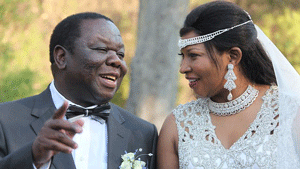
LYN* was very happy when her boyfriend of five years finally proposed marriage to her.
BY JENNIFER DUBE
But the 26-year-old Harare girl was however heartbroken when her aunt told her that “the fathers” expected groceries worth US$1 500 for the first meeting with the in-laws.
Her boyfriend was also expected to pay about US$9 000 for various charges and eight cows as lobola.
Three of the cows were expected before their wedding in August.
“I do not know where they think we will get all that money from,” Lyn said. “Not that I think I am not worth that much, but we do not have that money, our salaries are nowhere near US$1 000 when combined.”
Their relationship is on the verge of collapse because the boyfriend cannot afford to raise the required amount.
Lyn’s case is representative of many young couples who fall prey to “greedy” relatives that demand a lot of money as lobola.
- Chamisa under fire over US$120K donation
- Mavhunga puts DeMbare into Chibuku quarterfinals
- Pension funds bet on Cabora Bassa oilfields
- Councils defy govt fire tender directive
Keep Reading
Several people who spoke to Standardcommunity last week expressed mixed views on the issue of lobola charges.
Television personality Rebecca Chisamba, popularly known as Mai Chisamba, believes that the current lobola charges were unjustified.
“The charges are taboo,” she said. “People are no longer following culture. They have commercialised the practice and unfortunately, this is blocking our children from getting married.”
Mai Chisamba said parents should remember that the “boys” who were marrying their daughters did not have money.
“Many people think that marrying off a child presents them with a chance to cover everything they failed to do, that is why our children end up bringing us sugar daddies,” she said. “We need to understand that it is about building a relationship between the two families, full stop.”
Bulawayo East MP, Tabitha Khumalo said, like all other cultural things, it was difficult to define what should be accepted as justifiable lobola. “Cultural things are problematic,” Khumalo said. “All stakeholders need to come together and define what lobola is; whether it is a money-spinning venture, and if it is, properly look at its repercussions on the woman in her matrimonial home.”
In Kenya, she said, some people were campaigning for the abolishment of the practice. Their argument is that lobola created domestic violence whereby men turned women into assets because they “paid” for them.
However, history and cultural experts felt there was nothing sinister about what people were charging as lobola.
They said getting married had always been expensive.
“Years ago, people charged a hand hoe, which was a prized object at the time as it enabled them to cultivate more land than everyone else who cultivated with other objects,” said renowned historian Phathisa Nyathi. “The hand hoe was to be abandoned with the invention of the ox-drawn plough which became preferred as it was more valuable and gave more convenience.”
Nyathi said the invention of the tractor brought the price of the plough down, meaning people could still charge a tractor if they wanted.
He said things like mobile phones and laptops could soon be part of the payment package as lobola is about things society values at that moment. “It [lobola] is not fixed, It changes with time and embraces new things which society values. It only becomes a problem if we retrogress, for example moving from cows to chickens,” Nyati said.
Principal director in the Education ministry, Paul Damasane, said lobola was based on establishing relations and the sharing of wealth between the two families.
“Whether it is expensive or cheap is neither here nor there,” Damasane said. “In Ndebele culture for example, there are sayings which make it clear that the son-in-law should always support his in-laws and this remains the case even if he pays all the lobola he was charged.”
He said women should be valued because of the sacrifices and risks associated with child-bearing. *Not real name*











